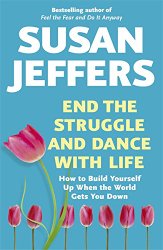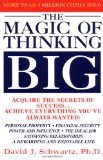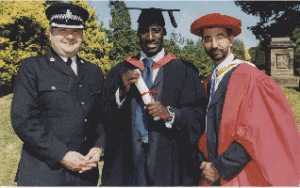
In life, it is guaranteed that you will worry, obsess, and at times for ever try to control everyone or everything around you. This will cause you to lose a sense of calm, control, and excitement about your existence.
You will start to think that much of your unhappiness comes from the world around you such as a bad economy, widespread crime, dangerous diseases, problems with relationships, lack of money, job dissatisfaction, and et cetera.
However, if you look deeply you will see that even though external factors may be agitators, they will never be the real cause of your struggle with life. This is why two people can face similar problems, yet react differently. Some individuals act with hopelessness when confronted with bad situations whilst others move with a relaxed composure.
In fact, those who approach living with a calm character master the art of dancing with life: they thrive, as opposed to struggle, by looking beyond the bad news in the world around them.
The real test of your character is not when things are going well, but when things are going wrong. Can you hold your head when others are losing theirs all around you?
To ensure that you too can peacefully dance with life, I highly recommend that you read ‘End the Struggle and Dance with Life’ written by Susan Jeffers.
Whenever you feel pressure, tiredness, or experience great difficulty with everyday living, you can open this book to any page and it will set you free, giving you the peace and comfort that you may need. This is the reason why I have, personally, been using this text for over the last 15 years.
.
THE SPIRITUAL OR HIGHER SELF
Susan Jeffers informs you that there is something wondrous within your being, which she calls the HIGHER SELF that is ever-present and always accessible. If you access it, your HIGHER SELF will enable you to feel free, safe, complete, and truly able to dance with life, and it is the source of all divine qualities like love, caring, intuition, strength, appreciation, joy, bliss, and gratitude.
Once discovered, on a deep cellular level, you can feel at one with the universe, and removed from the realm of ordinary experience into a sense of exquisite safety, peace, and harmony. All your personal problems relating to money, love, children, career, will seem simply unimportant and minor details in comparison.
However, mainstream western society will not teach you how to discover your HIGHER SELF. With its emphasis on the physical world, society will teach and train you how to struggle and worry, because it is not set up around the spiritual principles of a life that is well lived.
To begin the course towards your HIGHER SELF, all you require is awareness that there is more to life than the conventional way of living. This will allow your journey to start, and immediately open you to a world that has always contained a mixture of unforeseeable opportunities and possibilities.
Without connecting with the SPIRITUAL part of who you are, you will never obtain lasting peace, and feel like you are struggling in good times as well as bad. But by reading a text like ‘End the Struggle and Dance with Life,’ you will see that there are many ways, right now, to unite with your HIGHER SELF, regardless of your situation.
As a suitable example, this review will explore chapter 3, where the author shows you how and why it may be necessary to create a new definition of success if you want to connect with your HIGHER SELF, and end the struggle and dance with life.
.
CHAPTER 3 – CLIMB OFF THE LADDER TO DISTRESS
Starting with a quote, Jeffers tells you about a person who spent their entire life struggling to climb a ladder, only to find that when they made it to the top, it was resting against the wrong wall.
Unfortunately, this metaphor represents what is happening to many people in the world today, especially those in western society, who are trying to climb the ladder to success (that is the American Dream or Keeping Up with the Jones’ (UK)).
If you look around, you will see that many people with every step are experiencing more suffering, more anxiety, more distress, more frustration, and more emptiness. They are overworked, and are being hassled and pulled; left; right; and centre without receiving much spiritual reward in return.
Jeffers argues that the source of this problem is the common definition of success, which the Webster’s Dictionary states as “the attainment of wealth, position, honour or the like.” The problem with this description is that it:
- Focuses only on the final result: “…wealth, position, or the like”, without any consideration of the quality of your life as you climb your ladder to success. Would you be successful if by harming others everyday you attained wealth, position, or honour?
- Views success from an angle of competition: “…position, honour or the like”, which will cause you to feel divorced from others, and at battle on a daily basis with those around you.
- Fails to acknowledge the importance of achieving inner riches such as peace, joy, empathy, love, and thankfulness, which are all necessary for you to end your struggle and dance with life.
Ultimately, Jeffers argues that this definition of success will place you firmly in the position of the LOWER SELF. The LOWER SELF is based on you feeling fear and attempting, by any means necessary, to control everything around you. A major downside to operating from the point of the LOWER SELF is that you will not be able to see the bigger picture. It guarantees that you will struggle with everyday living, never feeling that you have enough, neither feeling that you will ever be enough.
As you climb the common ladder to success, ironically, you will feel less joyful, less content, less playful, and heavier. Therefore, in order to reverse this process, Jeffers strongly argues that you must:
- Move your ladder to a different wall.
- Climb out of your old conditioning and investigate a new spiritually orientated definition of success. This definition must focus primarily on the process rather than an outcome, emphasis partnership over competition, and stress the importance of acquiring internal richness like feelings of peace, love, thankfulness, and empathy.
- Be open to the possibility that there can be other ways of doing things, and explore other possibilities.
By following the above, inevitably you will increase the size and capacity of your HIGHER SELF; moreover, you will start to incorporate some of the many possibilities and opportunities in life that will almost certainly seem impossible to others.
As a suggestion, Jeffers offers the following definition of success, which she claims contains HIGHER SELF gifts that can transform a life of struggle into a life of tremendous joy:
“SUCCESS is living a full and balanced life in partnership with others to create a joyful feeling of love, contribution, appreciation, and abundance, despite how our endeavours may turn out (p. 32).”
.
CONCLUSION
Continuing the discussion, my background and past experiences reveal why it is extremely important that you let go of the common definition of success, and seek to connect with your HIGHER SELF.
.
Childhood
When I was about 8 years-old, firmly grounded in the LOWER SELF, I used to always feel scared and unsafe. The reason was that I lived in a poor and violent neighbourhood in London (UK) with an absent father, and I knew that my mother, a single parent, could not protect me.
Within my area, robberies and burglaries were common place, causing me to frequently wake up in the middle of the night fearful that someone would break into my house and attack my mother and me.
At the time, I never told anyone about my fear as I thought it was not a manly thing to do so whilst alone in my room, I would just try to return to sleep, looking above and repeatedly asking the soul searching question ‘God why me?’
Further to this and round about the same time, I always dreaded being sent to the local shops (West-Green Road), as I knew that I could not defend myself against the aggressive and ruthless young men that carried out illegal activity in my area.
But every weekend, without fail, my mother would ask me to go to the store. I would always try to hide my feelings of fear under the mask of annoyance; however, it never worked. My mother would insist that I go, so time and time again I would brace myself for the possibility of being physically attacked, and still ask myself the same question: ‘God why me?’
Year after year, I was subject to my violent community and given one of two choices; either, (1) prepare to lose my life by fighting back when others were guaranteed to attack me, or (2) continue living in fear and become a continuous victim.
I felt that I had no real choice. The people who were strong in my community were taught to prey constantly on the weak; therefore, I consistently choose to fight or, as a preventative measure, sought the friendship of those who had already established a good reputation for fighting. Sadly, I was experiencing deep emotional and at times physical pain and my life felt like it was forever on the line, therefore, I kept asking myself: ‘God why me, what did I do to live in such a place?’
.
Teenager – LOWER SELF
As you might expect, by the time that I reached my early teens, I had changed drastically, and was thoroughly conditioned by my community. To top it off, I also truly embraced the common definition of success promoted by the mass media.
Understandably, after being confronted with such a harsh reality for so many years, I became very strong mentally and physically, but completely lost my faith in God or my HIGHER SELF. I would have easily passed as an non-believer in religion, because I thought that if a person was a failure in life then he or she must have been responsible, as the world was all about survival of the fittest.
Looking back, I can now see that I wrongly thought that all people had the chance and the know how, to change their circumstances; therefore, if they did not do anything about a bad situation then it was only right that they suffer until they do.
Even though I was about 14 years old, within myself, I was still a scared 8 years-old boy, who just wanted to be at peace and left alone, but on the outside:
- People would do things for me out of fear rather than love
- I would consistently dream about one of my closest friends killing me due to his typical violent outburst
- I would plan how to strategically hurt others in order to ensure that my fierce reputation remained in tact
To show how much I bought into the common definition of success, my favourite motto at the time was taken from an Audi car commercial, which said:
“If you’ve got it, flaunt it, but if you ain’t got it, then get it!”
Following all the rules of survival in my community, I had a proven track record for being street smart, competitive, heartless, and prepared to seriously harm, if not kill, others. Yet, I had to reconcile that in mainstream society I was still treated as a nobody.
.
Teenager – HIGHER SELF
It was around this period that I started to read ‘The Magic of Thinking Big’, please see ‘About’ page for further information in regards to this time in my life. Using the knowledge from this book, I saw everything around me from a new perspective and realised that in spite of my ability to successfully survive in my community, I, and everyone I knew, was on a much larger course towards complete failure. 
Being very strategic, I thought about what type of person I would become in several years and saw that I was on a course towards becoming what many in the mainstream society expected and labelled a criminal. This really concerned me as I was only 14 years-old, yet by the standards set within my subculture, I was extremely successful.
Therefore, without hesitation, I decided to immediately follow the author’s advice and change my mind-set, convinced that it would enable me to avoid failure. This was the beginning of my journey towards my HIGHER SELF, as for the first time, I became aware that there was more to living than I was being taught.
Naturally, I started to inform my close friends about what I had learnt, and even encourage some of them to read the book, but disappointingly, they did not really appreciate its importance, or implement the author’s instructions. One friend, in particular, was going through such a rough time that shortly after I gave him the book he was sent to a mental hospital for depression. When his family found my book amongst his possession they thought that it was responsible for causing his mental illness because it had the word ‘magic’ in the title.
As time went on, many of the people I knew became more like the way I used to be, failing to understand that I genuinely felt that my bad behaviour was governed by my circumstances. For me, being destructive was not about fun or having a lust for power, I felt it was a necessity for my survival and so when I saw a way out, I took advantage of it immediately.
To cut a long story short, boys that were known for being very well behaved, within one or two years, totally, transformed into individuals that were very violent, competitive, and heartless.
Adding to this problem, the only business opportunity that allowed young men in my community to make decent money, was by selling drugs so predictably many of them went on to become low-level drug-dealers.
Ironically, it was always the drug dealers who most embraced the popular definition of success (designer clothes, fast cars, big houses, and beautiful girls) and, tragically, they were also the ones who would be stabbed, shot, killed, and imprisoned for various offences such as murder.
.
Professional Life – HIGHER SELF
Believing that life would always be better outside of my community, after attending law school and working in the legal profession, you can imagine my shock and horror to discover that the higher-up I went in society, the more competitive, aggressive, superficial and heartless many people appeared to become. 
Regardless of whether it is Banking and Finance, Health and Social Care, Law, Politics, Media, Medicine, or Sport, the LOWER SELF of heartlessness, aggressiveness, superficialness and competitiveness appears to be conducted undercover, behind smiles and handshakes – making it less respectable, a lot worse, and more sinister.
As mentioned above, many from my community, who embraced the common definition of success suffered from a lack of long-term achievement, imprisonment, or early death.
I later discovered that whether a person has a poor or wealthy background, in the end, embracing a common definition of success lead both groups to the same place, which is:
- The break-up of your most meaningful relationships
- A sense of missing your true purpose in life
- A lack of richness within, such as the feeling of peace, contentment, love, abundance, joy, happiness, thankfulness, etc
In agreement with the author, over time, I moved my ladder to a different wall; I climb out of my old conditioning and created a definition of success focused more on the process of life as opposed to a final result; I focused on working in partnership as opposed to competition, and started looking for other ways to live my life and remain connected to my HIGHER SELF. It is no coincidence that to date I have felt more contentment, peace, and happiness, which has also enabled me to become more knowledgeable than I, or anyone else, ever imagined that I would ever become.
‘End the Struggle and Dance with Life‘ is divided into three parts:
- Part 1 sets the scene by highlighting that there is a problem with the normal way of living,
- Part 2 shows you how to RELEASE or let go of many action and beliefs that will keep you submerged in struggle
- Part 3 shows you how to EMBRACE or take in the many beauties and richness within your life that you are almost guaranteed to easily overlook
As they say, “if you don’t go within, then you will go without.”
Until next time … “keep on evolving!”
Tom